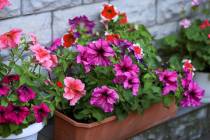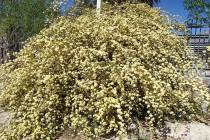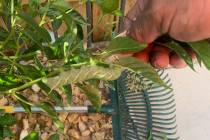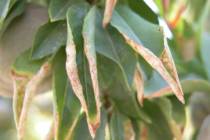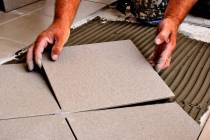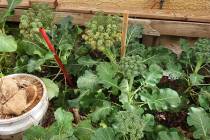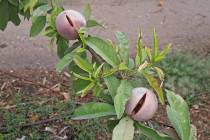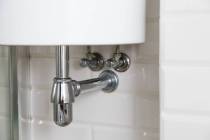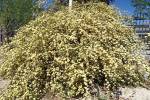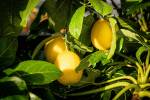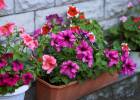DREAMING OF A GREEN CHRISTMAS
After weeks of standing around doing nothing but looking beautiful -- with a short stint of guarding pretty packages from jolly old St. Nick -- it's time to put your Christmas tree to work. That's right, work.
Starting Saturday, you can drop off your Christmas tree at any one of 22 sites valleywide, where it will be chipped into bits and turned into mulch. The mulch is then used in public gardens and parks throughout the valley to help conserve soil moisture and keeps plants healthy.
"The more trees we get, the more places we can put down mulch," said Angela O'Callaghan, social horticulture specialist at the University of Nevada Cooperative Extension, one of the Christmas Tree Recycling Program's sponsors.
Once there is enough Christmas tree mulch for all the public parks, it will be used on plants at Clark County schools and, hopefully, distributed to the public, she said.
O'Callaghan said bark mulch, such as the type obtained from chipped Christmas trees, is ideal to help protect plants from cold winter temperatures and provide nutrients as it decomposes.
Not only does the mulch help plants survive the winter, recycling live trees is good for the environment.
"It may seem as if artificial trees are a sustainable alternative to farmed, fresh-cut Christmas trees, but actually the opposite is true," said Elizabeth Herridge, managing director of the Springs Preserve, a program sponsor. "Artificial trees are often imported from thousands of miles away utilizing fossil fuels to get here and when they wear out they ultimately end up in a landfill. Recycled fresh cut trees are returned to nature as mulch, helping to beautify our local parks."
In addition to targeting Las Vegas residents, this year the Christmas Tree Recycling Program has enlisted tree lot operator Linda Maplethorpe to help put a special focus on tree lot and retail operators asking them to recycle unsold trees.
"A quarter million trees get sold in Southern Nevada and we're lucky if we recycle 20,000," O'Callaghan said. "It's silly. There are 22 drop-off sites around town and there's even a company that will bag your tree, clean up and take it out to the chipping site."
The service, available through 1-800-GOT-JUNK?, will be offered Dec. 26 through Jan. 15 between the hours of 9 a.m. and 6 p.m. For $30 the company will remove your tree and vacuum of all pine needles in the home. The trees then will be dropped off at one of the designated recycling points.
To schedule a pick up, call 1-800-468-5865 (1-800-GOT-JUNK) 24 hours a day or 271-9333 from 9 a.m. to 5 p.m. Monday through Friday.
Otherwise, there is no fee to participate in the recycling program. It continues through Jan. 15.
The Christmas tree recycling program has been offered in Southern Nevada for more than nine years. Last year, more than 15,000 trees were recycled.
Since the program's inception in 2001, Las Vegas Valley residents have recycled 65,599 trees, saving 8,747 cubic yards of landfill space and creating 570 tons of mulch.
In order for a tree to be chipped into mulch, it must be free of all ornaments, lights, wires and tinsel. Flocked trees cannot be recycled.
For more information about the Christmas tree recycling program, visit www.springspreserve.org or call 822-7700.









